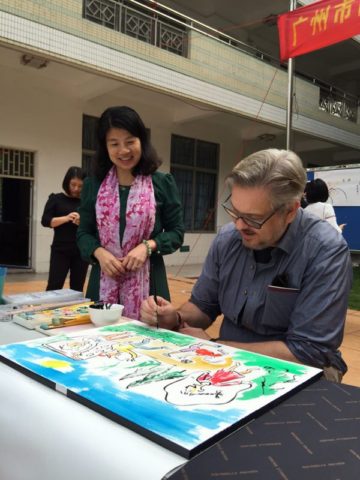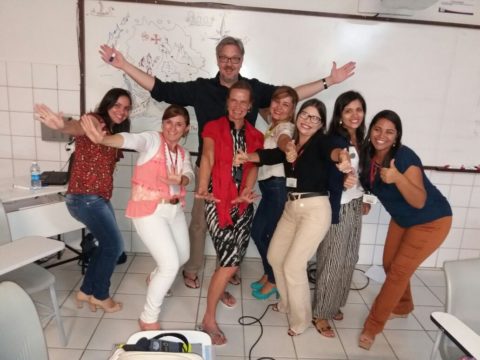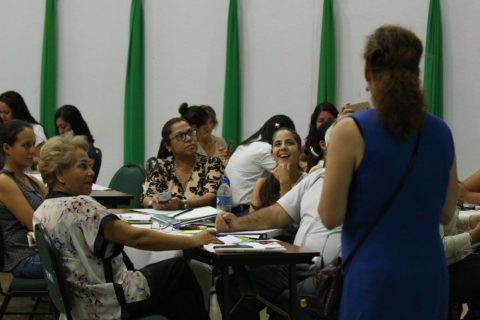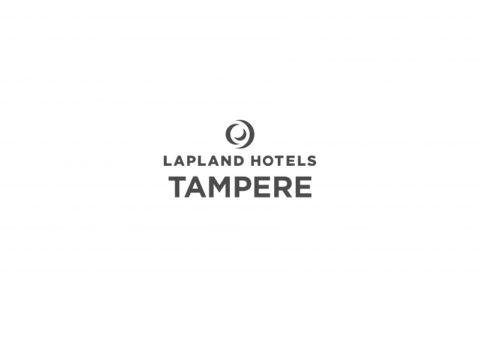27.11.2017, Juha Lahtinen
What is pedagogical leadership?
Finnish schools are led and managed exceptionally well. It is the principals and headmasters who lay the foundation for equality and trust in Finnish schools. It is those people who make sure that teachers and students can perform at their best and achieve outstanding results. This article describes the Finnish idea of pedagogical leadership and what it includes. The article represents the ideas of a school as a learning community, shared leadership, school and team organization and how to lead that etc.
 Pedagogy can be defined as the understanding of how learning takes place and the philosophy and practice that supports that understanding of learning. Essentially it is the study of the teaching and learning process. Leadership is often defined as the act of leading or guiding individuals or groups. If we are to combine these two we are offered the notion of pedagogical leadership as leading or guiding the study of the teaching and learning process (Coughlin & Baird 2013, 1).
Pedagogy can be defined as the understanding of how learning takes place and the philosophy and practice that supports that understanding of learning. Essentially it is the study of the teaching and learning process. Leadership is often defined as the act of leading or guiding individuals or groups. If we are to combine these two we are offered the notion of pedagogical leadership as leading or guiding the study of the teaching and learning process (Coughlin & Baird 2013, 1).
Pedagogical leader can be considered to be a person who by his actions, speeches or otherwise promotes pedagogical activity. Pedagogical leadership requires special readiness and ability based on the hidden attitudes of the leader. The leader’s role includes the feeling of leadership and authority, such as a teacher or pedagogue, but the forms, techniques, and methods are different.
The concept of pedagogical leadership brings leadership closer to people’s interaction, as opposed to the previous hierarchical leadership style. The management of pedagogy is a management of the whole – how the personnel can work in their work as educators and learn and develop in their work. Pedagogical leadership, on the other hand, is the management of personnel learning, and its implementation is defined by each leader’s own learning concept.
Finnish education policy has been built upon sustainable leadership led by commonly accepted values and shared vision (Sahlberg 2017, 150). During last years we have discussed more holistic way about pedagogical leadership in basic education. What do we mean with pedagogical leadership? There is no specific answer nor one answer but different definitions.
In Finland we say that most vital part of principal´s work is to lead school pedagogically (Pokka 2015, 55). Ari Pokka (2015) writes in his book Top Class, Finnish School Leadership and Management that to lead pedagogically is the acknowledgement of the most important objectives of the work. These objectives are set in the national distribution of lesson hours, the national core curriculum, the local curricula, the law, the national and local development plans for education and research, and finally the strategic plan of the education provider. These objectives are actualized in the school´s annual operating plan (Pokka 2015, 55.)
 In the transition from 1990´s to 21st century, the lesson framework reform ultimately changed principal´s work in Finland. For the first time principals were now supposed to take a genuine leading role in their own school´s pedagogical practices, responsibilities and priorities, instead of just implementing legal regulations – the road towards pedagogical leadership was paved (Alava, Halttunen, Risku 2012, 23).
In the transition from 1990´s to 21st century, the lesson framework reform ultimately changed principal´s work in Finland. For the first time principals were now supposed to take a genuine leading role in their own school´s pedagogical practices, responsibilities and priorities, instead of just implementing legal regulations – the road towards pedagogical leadership was paved (Alava, Halttunen, Risku 2012, 23).
Alava, Halttunen and Risku (2012, 23) continue: “The main idea of this considerably radical reform of school administration was that the objectives set for schools would be achieved through developing school-specific procedures and objectives based on regional, local and school-specific circumstances. These operating models no longer come from up high; instead, a principal a principal needs to be capable of ensuring the viability of the school on their own and its ability also to perform well in the long term. Delegation of the decision-making powers to principals and the school heads genuinely emphasizes the leader´s responsibility for performance (Mustonen, 2003). Of course, one of the most important instrument guiding school operation is the National Core Curriculum and Local Curriculum based on that.
In Finland it is principal’s responsibility to take care that teaching and learning are based on the core curriculum and local curriculum. The local curriculum is an important part of the steering of education. It plays a key role in setting out and implementing both national targets and goals and tasks considerer important locally. The local curriculum lays a common foundation for and points the direction to daily schoolwork (National Core Curriculum 2014, 9). The pedagogical leadership is also showing that direction. Pedagogical leader is holding the vision and makes the curriculum more attractive tool for teacher’s pedagogical development. In core curriculum it is written so that it is a strategic and pedagogical tool that defines the policies for the education provider´s operation and the work carried out by the schools. The curriculum links the operation of the school to other local activities aiming to promote the well-being and learning of children and young people.
 In schools, all the actions should focus on pupils‘ and students´ learning. The school is for improving learning and competences. The foundation of pedagogical leadership is interaction between educators and pupils/students. In that point of view, pedagogical leadership is leading the interaction between all the people inside the school community as well as all the stakeholders outside the school. Leaders need deep understanding of diversity management, well-being, interaction, supportive and coaching leadership and knowledge management.
In schools, all the actions should focus on pupils‘ and students´ learning. The school is for improving learning and competences. The foundation of pedagogical leadership is interaction between educators and pupils/students. In that point of view, pedagogical leadership is leading the interaction between all the people inside the school community as well as all the stakeholders outside the school. Leaders need deep understanding of diversity management, well-being, interaction, supportive and coaching leadership and knowledge management.
If you are curious to know more, our one-week Principal Study Tour program gives visitors a deeper insight to principal´s work as a pedagogical leader in Finnish school community.
-Juha Lahtinen
References:
Jukka Alava, Leena Halttunen & Mika Risku (2012), Changing school management, Finnish National Board of Education
Anne-Marie Caughlin & Lorrie Baird (2013), London Bridge Child Care Services & Kawartha Child Care Services
National Core Curriculum in Basic Education (2014), Finnish Board of Education
Ari Pokka (2015), Topclass, Finnish School Leadeship and management, Cultural Coop Vehrä & Bookcover Publishing Ltd.
Pasi Sahlberg (2007), Education policies for raising student learning: the Finnish approach, Journal of Education Policy, 22:2, 147-171












Follow us: